
"Don't Speak" is a song by American rock band No Doubt from their third studio album, Tragic Kingdom (1995). It was released in 1996 as the third single from Tragic Kingdom in the United States by Interscope Records. Lead singer Gwen Stefani and her brother Eric Stefani, former No Doubt member, wrote the song originally as a love song. The song went through several rewrites and new versions. Gwen modified it into a breakup song about her bandmate and ex-boyfriend Tony Kanal, shortly after he ended their seven-year relationship.

New Radicals was an American alternative rock band formed in 1997 in Los Angeles. The band was centered on the duo of Gregg Alexander and Danielle Brisebois, and augmented by session and touring musicians.

"MMMBop" is a song written and performed by American pop rock band Hanson. It was released on April 15, 1997, as the lead single from their first full-length studio album, Middle of Nowhere (1997). The song was nominated for two Grammys at the 40th Annual Grammy Awards and is the band's most successful single to date. "MMMBop" was a major success worldwide, reaching number one in at least 12 countries, including Australia, Canada, Germany, New Zealand, the United Kingdom and the United States.
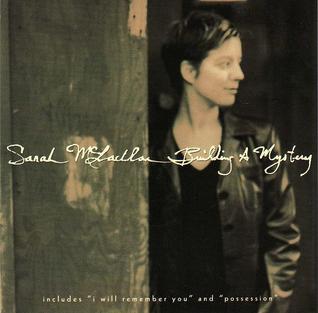
"Building a Mystery" is a song by Canadian singer-songwriter Sarah McLachlan from her fourth studio album, Surfacing (1997). At a live performance, Sarah explains the song as being "basically about the fact that we all... have insecurities to hide, and we often do that by putting on a facade." She also goes on to say that "unfortunately, if we just be who we are, that's usually the more attractive and beautiful thing".

"My Favorite Mistake" is the first single from Sheryl Crow's third studio album, The Globe Sessions (1998), released on August 31, 1998, through A&M Records. Crow wrote the song about a relationship with a man who proves to be unfaithful and is widely believed to have been written about Eric Clapton. Released in 1998, the single peaked at number 20 on the US Billboard Hot 100, becoming Crow's fifth top-20 single in the United States, while reaching number two in Canada and giving Crow her seventh top-five hit there. In the United Kingdom, it reached number nine, becoming her last top-10 single in Britain.

"What's Up?" is a song by American rock group 4 Non Blondes, released in March 1993 by Interscope and Atlantic Records as the second single from their debut album, Bigger, Better, Faster, More! (1992). The song was written by lead singer Linda Perry and produced by David Tickle. It has gained popularity in the United States and in several European countries, peaking at number one in Austria, Belgium, Denmark, Germany, Iceland, Ireland, the Netherlands, Norway, Poland, Sweden, and Switzerland. The accompanying music video was directed by American film director Morgan Lawley and was also nominated in the category for Best Alternative Rock Video at the MTV Video Music Awards.
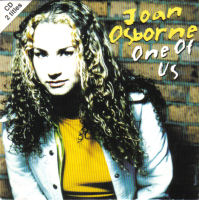
"One of Us" is a song by American singer Joan Osborne for her debut studio album, Relish (1995). Written by Eric Bazilian of the Hooters and produced by Rick Chertoff, the song was released on November 21, 1995, as Osborne's debut single and lead single from Relish, and it became a hit in November of that year, peaking at number four on the US Billboard Hot 100 and earning three Grammy nominations.

"Mickey" is a song recorded by American singer Toni Basil for her debut studio album, Word of Mouth (1981). It was first recorded by the pop group Racey. Mike Chapman and Nicky Chinn wrote the song, while production was helmed by Greg Mathieson and Trevor Veitch. Basil's version is new wave, featuring guitar, synthesizers and cheerleading chants. It garnered a mixed response from music critics, with some critics praising the radio-friendly nature of the song, while others described some of the lyrics as obscene.
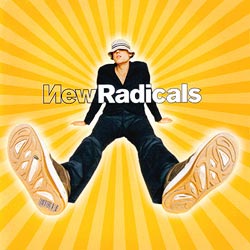
Maybe You've Been Brainwashed Too is the only studio album by American alternative rock band the New Radicals. Released October 20, 1998, it is their only album release before disbanding in 1999. The album charted in several North American and European countries, and was frontman Gregg Alexander's third album, following two unsuccessful albums released in 1989 and 1992. For the album's recording, Alexander enlisted numerous session musicians and is the only band member to perform on every song. The album's musical style was compared to numerous rock artists, including Billy Corgan, Chumbawamba, and the Rolling Stones.

"Someday We'll Know" is a song by the New Radicals. It was released in March 1999 as the second single off their album Maybe You've Been Brainwashed Too (1998). Lyrically, the song explores the confusion over why a relationship ended. The group dissolved before the single's release, and as a result the song failed to match the success of the preceding single, "You Get What You Give", which had topped the charts in New Zealand and Canada and peaked within the top 5 in the United Kingdom. In contrast, "Someday We'll Know" became a top 40 hit only in Brazil where it made number 38 there, and failed to chart on the Billboard Hot 100. The song is the group's second and final single, and has been covered by numerous artists, including Mandy Moore & Jon Foreman of Switchfoot, America and Hall & Oates.

"Waterfalls" is a song by American hip-hop group TLC, released by LaFace and Arista as the third single from their second album, CrazySexyCool (1994), on May 22, 1995 in the United States, followed by a United Kingdom release on July 24, 1995.
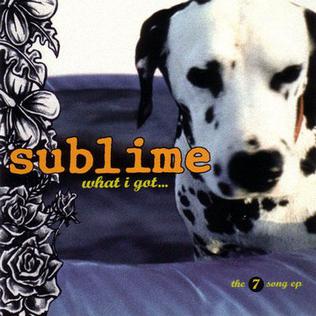
"What I Got" is a song from American band Sublime's self-titled third album (1996). It was released after singer Bradley Nowell's death in 1996 from a heroin overdose and became the band's biggest radio hit. The song's chorus is a lift from "Loving" by reggae artist Half Pint, who is credited as a co-writer.
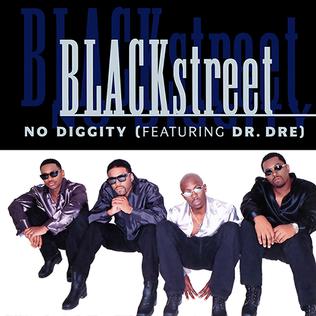
"No Diggity" is a song by American R&B group Blackstreet as the first single for their second studio album, Another Level (1996), featuring Dr. Dre and Queen Pen. Released on July 29, 1996 by Interscope, the song reached number one on the US Billboard Hot 100 and in Iceland and New Zealand. It ended "Macarena"'s 14-week reign atop the Billboard Hot 100. In the United Kingdom, the song peaked at number nine. "No Diggity" was the final number-one single of Cash Box magazine. The track sold 1.6 million copies in 1996 and won the 1998 Grammy Award for Best R&B Performance by a Duo or Group with Vocals. It uses samples from Bill Withers's "Grandma's Hands". The music video for the song was directed by Hype Williams.

"What I Am" is a song written by Edie Brickell and Kenny Withrow and recorded by Edie Brickell & New Bohemians for their debut album, Shooting Rubberbands at the Stars (1988). The song is highlighted by a guitar solo that notably features an envelope filter. It peaked at number seven on the US Billboard Hot 100, topped the Canadian RPM 100 Singles chart, and became a top-20 hit in Australia and New Zealand. "What I Am" was ranked number 23 on VH1's list of the "100 Greatest One-Hit Wonders of the 80s".

"Real Love" is a song by American singer Mary J. Blige from her debut studio album, What's the 411? (1992). Based on real life experiences, it was written and produced by Cory Rooney and Mark Morales, and samples Audio Two's 1987 song "Top Billin'". The song was issued as the album's second single on July 28, 1992 by Uptown and MCA. It became Blige's first top-10 hit, peaking at number seven on the US Billboard Hot 100. It also topped the Billboard Hot R&B/Hip-Hop Songs and Rhythmic charts and was certified Gold by the Recording Industry Association of America (RIAA) on November 4, 1992. Marcus Raboy directed the song's music video. Rolling Stone included "Real Love" in their list of "500 Best Songs of All Time" in 2021 at number 327.

"Believe" is a song by American singer Cher from her 22nd studio album, Believe (1998). It was released as the album's lead single on October 19, 1998, by Warner Bros. Records. After circulating for months, a demo written by Brian Higgins, Matthew Gray, Stuart McLennen and Timothy Powell, was submitted to Warner's chairman Rob Dickins, while he was scouting for songs to include on Cher's new album. Aside from the chorus, Dickins was not impressed by the track so he enlisted two more writers, Steve Torch and Paul Barry in order to complete it. Cher also later did some adjustments herself to the lyrics but did not get a songwriting credit. Recording took place at Dreamhouse Studio in West London, while production was handled by Mark Taylor and Brian Rawling.

"Slide" is a song by American alternative rock group Goo Goo Dolls. It was released as the first single from their sixth studio album, Dizzy Up the Girl, in September 1998. According to lead guitarist John Rzeznik, the song is about a Catholic girl who becomes pregnant and discusses with her boyfriend how they should respond to it. Musically, the track is a jangle pop and alternative rock song.

"Closing Time" is a song by American rock band Semisonic. It was released on March 10, 1998, as the lead single from their second studio album, Feeling Strangely Fine, and began to receive mainstream radio airplay on April 27, 1998. The ballad was written by Dan Wilson and produced by Nick Launay.

"Barely Breathing" is a song by American singer-songwriter Duncan Sheik from his eponymous debut studio album (1996). It was released as the lead single from the album on May 3, 1996, by Atlantic Records. Sheik is the sole writer of the song, while production was helmed by Rupert Hine. The song became a chart hit in North America in early 1997, receiving several accolades in the years following its release.

"Barbie Girl" is a song by Danish-Norwegian dance-pop group Aqua. It was released in April 1997 by Universal and MCA as the third single from the group's debut studio album, Aquarium (1997). The song was written by band members Søren Rasted, Claus Norreen, René Dif, and Lene Nystrøm, and was produced by the former two alongside Johnny Jam and Delgado. It was written after Rasted saw an exhibit on kitsch culture in Denmark that featured Barbie dolls. The accompanying music video was directed by Danish directors Peder Pedersen and Peter Stenbæk.




















